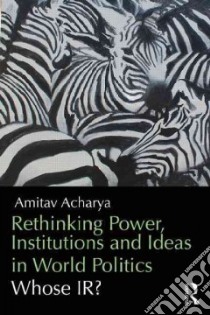- Libreria
- >
- Libri in lingua
- >
- Politica
- >
- Struttura e processi politici
Rethinking Power, Institutions and Ideas in World Politics - 9780415706742
Un libro in lingua di Amitav Acharya edito da Routledge, 2013
- € 49.40
- Il prezzo è variabile in funzione del cambio della valuta d’origine
In this collection of work by renowned scholar Amitav Acharya, Acharya draws on extensive research from throughout his career and examines the dominant understandings of three of the most important theoretical concepts used by scholars of world politics: power, institutions and ideas. A key purpose of this collection is to examine how these concepts, when applied to the world at large, are to different degrees limited in capturing the contexts, experiences and agencies of the actors in the world beyond the West. Through this he seeks to identify and explore alternative understandings that can expand the dynamics of power, institutions and ideas in the broader and more inclusive context of world politics.
As a discipline, International Relations (IR) has seen endless contestations and compromises over its theories, paradigms and methods. The aim of this book is not to engage in a grand debate, but rather to make a case for rendering the discipline more genuinely global by engaging the ideas, voices and experiences of the non-Western world.
To make its point, the book critically discusses numerous examples and case studies such as the image of the Cold War as a "long peace" the global War on Terror, multilateral institutions, approaches to regional integration and cooperation in Europe, Asia, and elsewhere, and the creation and diffusion of ideas and norms such as non-intervention, cooperative security, and humanitarian intervention. It ends by suggesting pathways towards a Global IR - a forward-looking enterprise that is reflective of the multiple and global heritage of IR in a changing and interconnected world.
The need for recasting the discipline has motivated and undergirded Acharya's own scholarship since his entry into the field over three decades ago. This book reflects his own engagement, quarrels and compromises, with the discipline that we have called, mistakenly he argues, international relations.
Informazioni bibliografiche
- Titolo del Libro in lingua: Rethinking Power, Institutions and Ideas in World Politics
- Sottotitolo: Whose Ir?
- Lingua: English
- Autore: Amitav Acharya
- Editore: Routledge
- Collana: Routledge (Paperback)
- Data di Pubblicazione: 20 Dicembre '13
- Genere: POLITICAL SCIENCE
- Argomenti : International relations World politics POLITICAL SCIENCE / General. bisacs
- Pagine: 264
- Dimensioni mm: 233 x 155 x 0
- ISBN-10: 0415706742
- EAN-13: 9780415706742


